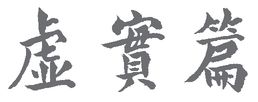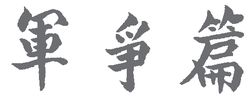Art of War (Barnes & Noble Classics Series) (6 page)
Read Art of War (Barnes & Noble Classics Series) Online
Authors: Sunzi

BOOK: Art of War (Barnes & Noble Classics Series)
4.91Mb size Format: txt, pdf, ePub
1. Sun Tzu said: The control of a large force is the same in principle as the control of a few men: it is merely a question of dividing up their numbers.
2. Fighting with a large army under your command is nowise different from fighting with a small one: it is merely a question of instituting signs and signals.
3. To ensure that your whole host may withstand the brunt of the enemy’s attack and remain unshaken—this is effected by manœuvres direct and indirect.
4. That the impact of your army may be like a grindstone dashed against an egg—this is effected by the science of weak points and strong.
5. In all fighting, the direct method may be used for joining battle, but indirect methods will be needed in order to secure victory.
6. Indirect tactics, efficiently applied, are inexhaustible as Heaven and Earth, unending as the flow of rivers and streams; like the sun and moon, they end but to begin anew; like the four seasons, they pass away but to return once more.
7. There are not more than five musical notes, yet the combinations of these five give rise to more melodies than can ever be heard.
8. There are not more than five primary colours, yet in combination they produce more hues than can ever be seen.
9. There are not more than five cardinal tastes, yet combinations of them yield more flavours than can ever be tasted.
10. In battle, there are not more than two methods of attack—the direct and the indirect; yet these two in combination give rise to an endless series of manœuvers.
11. The direct and the indirect lead on to each other in turn. It is like moving in a circle—you never come to an end. Who can exhaust the possibilities of their combination?
12. The onset of troops is like the rush of a torrent which will even roll stones along in its course.
13. The quality of decision is like the well-timed swoop of a falcon which enables it to strike and destroy its victim.
14. Therefore the good fighter will be terrible in his onset, and prompt in his decision.
15. Energy may be likened to the bending of a crossbow; decision, to the releasing of the trigger.
16. Amid the turmoil and tumult of battle, there may be seeming disorder and yet no real disorder at all; amid confusion and chaos, your array may be without head or tail, yet it will be proof against defeat.
17. Simulated disorder postulates perfect discipline; simulated fear postulates courage; simulated weakness postulates strength.
18. Hiding order beneath the cloak of disorder is simply a question of subdivision; concealing courage under a show of timidity presupposes a fund of latent energy; masking strength with weakness is to be effected by tactical dispositions.
19. Thus one who is skilful at keeping the enemy on the move maintains deceitful appearances, according to which the enemy will act. He sacrifices something, that the enemy may snatch at it.
20. By holding out baits, he keeps him on the march; then with a body of picked men he lies in wait for him.
21. The clever combatant looks to the effect of combined energy, and does not require too much from individuals. Hence his ability to pick out the right men and to utilise combined energy.
22. When he utilises combined energy, his fighting men become as it were like unto rolling logs or stones. For it is the nature of a log or stone to remain motionless on level ground, and to move when on a slope; if four-cornered, to come to a standstill, but if round-shaped, to go rolling down.
23. Thus the energy developed by good fighting men is as the momentum of a round stone rolled down a mountain thousands of feet in height. So much on the subject of energy.

WEAK POINTS AND STRONG

1. Sun Tzu said: Whoever is first in the field and awaits the coming of the enemy, will be fresh for the fight; whoever is second in the field and has to hasten to battle, will arrive exhausted.
2. Therefore the clever combatant imposes his will on the enemy, but does not allow the enemy’s will to be imposed upon him.
3. By holding out advantages to him, he can cause the enemy to approach of his own accord; or, by inflicting damage, he can make it impossible for the enemy to draw near.
4. If the enemy is taking his ease, he can harass him; if well supplied with food, he can starve him out; if quietly encamped, he can force him to move.
5. Appear at points which the enemy must hasten to defend; march swiftly to places where you are not expected.
6. An army may march great distances without distress, if it marches through country where the enemy is not.
7. You can be sure of succeeding in your attacks if you only attack places which are undefended. You can ensure the safety of your defence if you only hold positions that cannot be attacked.
8. Hence that general is skilful in attack whose opponent does not know what to defend; and he is skilful in defence whose opponent does not know what to attack.
9. O divine art of subtlety and secrecy! Through you we learn to be invisible, through you inaudible; and hence we can hold the enemy’s fate in our hands.
10. You may advance and be absolutely irresistible, if you make for the enemy’s weak points; you may retire and be safe from pursuit if your movements are more rapid than those of the enemy.
11. If we wish to fight, the enemy can be forced to an engagement even though he be sheltered behind a high rampart and a deep ditch. All we need do is to attack some other place that he will be obliged to relieve.
12. If we do not wish to fight, we can prevent the enemy from engaging us even though the lines of our encampment be merely traced out on the ground. All we need do is to throw something odd and unaccountable in his way.
13. By discovering the enemy’s dispositions and remaining invisible ourselves, we can keep our forces concentrated, while the enemy’s must be divided.
14. We can form a single united body, while the enemy must split up into fractions. Hence there will be a whole pitted against separate parts of a whole, which means that we shall be many to the enemy’s few.
15. And if we are able thus to attack an inferior force with a superior one, our opponents will be in dire straits.
16. The spot where we intend to fight must not be made known; for then the enemy will have to prepare against a possible attack at several different points; and his forces being thus distributed in many directions, the numbers we shall have to face at any given point will be proportionately few.
17. For should the enemy strengthen his van, he will weaken his rear; should he strengthen his rear, he will weaken his van; should he strengthen his left, he will weaken his right; should he strengthen his right, he will weaken his left. If he sends reinforcements everywhere, he will everywhere be weak.
18. Numerical weakness comes from having to prepare against possible attacks; numerical strength, from compelling our adversary to make these preparations against us.
19. Knowing the place and the time of the coming battle, we may concentrate from the greatest distances in order to fight.
20. But if neither time nor place be known, then the left wing will be impotent to succour the right, the right equally impotent to succour the left, the van unable to relieve the rear, or the rear to support the van. How much more so if the furthest portions of the army are anything under a hundred
li
apart, and even the nearest are separated by several
li
!
li
apart, and even the nearest are separated by several
li
!
21. Though according to my estimate the soldiers of Yüeh exceed our own in number, that shall advantage them nothing in the matter of victory. I say then that victory can be achieved.
22. Though the enemy be stronger in numbers, we may prevent him from fighting. Scheme so as to discover his plans and the likelihood of their success.
23. Rouse him, and learn the principle of his activity or inactivity. Force him to reveal himself, so as to find out his vulnerable spots.
24. Carefully compare the opposing army with your own, so that you may know where strength is superabundant and where it is deficient.
25. In making tactical dispositions, the highest pitch you can attain is to conceal them; conceal your dispositions, and you will be safe from the prying of the subtlest spies, from the machinations of the wisest brains.
26. How victory may be produced for them out of the enemy’s own tactics—that is what the multitude cannot comprehend.
27. All men can see the tactics whereby I conquer, but what none can see is the strategy out of which victory is evolved.
28. Do not repeat the tactics which have gained you one victory, but let your methods be regulated by the infinite variety of circumstances.
29. Military tactics are like unto water; for water in its natural course runs away from high places and hastens downwards.
30. So in war, the way is to avoid what is strong and to strike at what is weak.
31. Water shapes its course according to the nature of the ground over which it flows; the soldier works out his victory in relation to the foe whom he is facing.
32. Therefore, just as water retains no constant shape, so in warfare there are no constant conditions.
33. He who can modify his tactics in relation to his opponent and thereby succeed in winning, may be called a heaven-born captain.
34. The five elements are not always equally predominant; the four seasons make way for each other in turn. There are short days and long; the moon has its periods of waning and waxing.


Other books
Turning Point by Barbara Spencer
Deepwood: Karavans # 2 by Roberson, Jennifer
Romano and Albright 01 - Catch Me If You Can (MM) by L.B. Gregg
Guilty Gucci by Antoinette, Ashley
My Lady Series Bundle by Shirl Anders
Regency Wagers by Diane Gaston
The Covert Wolf by Bonnie Vanak
The 88th Floor by Benjamin Sperduto
Dead on Arrival by Lawson, Mike
Deep Six by Clive Cussler